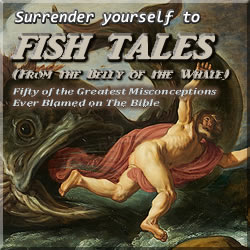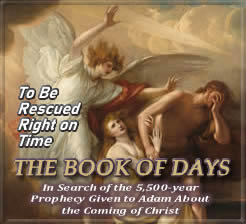Prophecy, Deja Vu, and the Dream State
Questions Concerning the Discernment of Future Events
ABSTRACT: One of the most overlooked aspects concerning the subject of biblical prophecy is that some one-third of the prophecies in The Bible originated as a dream—or as is sometimes the case, a vision, which is just another way of saying a waking dream. If that’s true, then perhaps the domain of prophecy isn’t restricted to just the prophets of old but is also open to all humans due to the fact that we all dream…
ASK THE AVERAGE PERSON on the street: “Why are there prophecies in The Bible?” And no doubt you’d receive the same answer every time.
They’d say, “Why, of course, that’s easy—to predict the future, silly. Why else?”
Yes, how silly of me—to predict the future, of course; that’s the assumption of most people, believers and unbelievers alike. I mean, even the dictionary defines the word “prophecy” as the foretelling or prediction of what’s to come. What’s more, this word “prophecy” is accompanied by an assortment of synonyms, all which allude to the same thing—words like “forecast,” “prognostication,” “prognosis,” and “divination.” Based on this, then, why else would anyone think otherwise? If the dictionary defines “prophecy” as a prediction, and The Bible uses the word “prophecy” when speaking of events that are yet to occur, then naturally we’d assume that God has His prophets “prophesying” to predict the future.
There’s only one problem with that kind of logic: The way mankind defines words is usually different from how the God of The Bible defines them, as is the case with words like “saint,” “sanctify,” and “holy.” And just as we’re able to determine the true meaning of those words by looking to their scriptural context, we’ll do the same thing with the word “prophecy.” Not only will this provide us with its true meaning, but it’ll also impart a greater insight into the purpose of prophecy itself, as well as The Bible as a whole.
But before we turn to Scripture to see how it conveys the meaning of prophecy, let’s first establish why most people assume that prophecies in The Bible are placed there by God so we can predict the future.
Apart from strictly biblical texts, several sources promote the idea that prophecy enables humanity to foretell the future. Of the various religions besides Christianity and Judaism, others, like Islam, Hinduism, Buddhism, the Bahá’í Faith, and some Native American tribes, have their prophecies and prophets. Sometimes, as in the case of the Grecian culture, the notion of prophecy was associated not with a particular religion but with a particular site where oracular utterances occurred, like the Oracle of Delphi. Then, quite apart from any particular religion or place, certain unique individuals became famous for their apparent ability to predict future events, like Joan of Arc, Nostradamus, and Edgar Cayce.
Against such a universal backdrop of human experience, it’s no wonder that whenever we consider the role of biblical prophets and prophecy, we expect the same thing. Of course, before we go along with the crowd simply because that’s how we’ve always been taught to view prophecy, I’d like to offer a tool in deciphering the true meaning and purpose of this prophetic gift that pervades humanity.
IN PROVIDING THIS TOOL, I hope to accomplish two things. First, I’d like to show that, although prophecy plays a huge role in The Bible, it’s by no means limited to its pages. Second, although the gift of prophecy isn’t just in the biblical record, its role in Scripture is unique among all other sources, particularly in terms of the historical nature of those prophecies. And by that I mean, whereas many cultures contain traces of this prophetic impulse, the prophecies in The Bible are unique in the way they’re historically grounded and verifiable in terms of the timing of their fulfillment. It’s this central fact of biblical prophecy—again, as distinct from all other prophetic traditions—that’s given rise to the notion that those prophecies can predict future events virtually down to the year and day of their occurrence.
But before we can make our final judgment on this aspect of prophecy, we should first examine how the gift of prophecy isn’t limited to the prophets in The Bible but is something all humans exhibit, although to lesser degrees.
Story Continues Below
To hear Kent and Zen Garcia talk about correcting biblical misconceptions, from October 28, 2021, CLICK BELOW.
Story Continues From Above
Truth be told all humans possess this gift simply by virtue of being human. How can I make such a claim? I do so because of a peculiar phenomenon, which, like the universal belief in Heaven or Hell, just happens to be another of those distinctly human traits common to people the world over. I’m talking about déjà vu.
Returning to the dictionary, we find that déjà vu is an expression derived from the French, meaning “already seen,” which describes a feeling of having already experienced our present situation. By some estimates, roughly seventy percent of the global population claims to have experienced déjà vu in one form or another. Sometimes it occurs upon entering a room in which we feel we’ve been before, even though we know we haven’t. Other times, we might feel we recognize someone, even though we know we’re meeting this person for the very first time. Or, during a conversation with someone, we suddenly feel like we’ve had this same conversation with this same person, even though we know we haven’t. In each and every case, we come to the vague realization, however irrational it may be, that our present life has somehow merged with either our past or our future—depending on our philosophy of life.
Now, at this point, you might be saying, “So, this is all well and good, but what’s it got to do with whether or not prophecies in The Bible predict the future?”
The reason I mention it is because I’m not interested just in looking at the pros and cons of a given misconception. I’m also interested in the question of how they got started in the first place. As I’ve previously stated, because I don’t believe misconceptions are the product of institutionally-driven conspiracies, I see their development in terms of how humans function as a species. In other words, I see them developing as the result of the tendencies of the human psyche itself.
So, before I offer my final verdict in the matter of “biblical prophecy,” I’d first hope to lay a secure foundation on the nature of “human prophecy,” if I may call it that. I say “human prophecy” because unlike those who insist that déjà vu is the result of an aspect of the past that’s acting upon our present, I believe what’s intruding into our consciousness is the future.
Now, before you dismiss this possibility too quickly, let me steer you toward a way to connect this all-too-human experience of déjà vu with that all-too-spiritual phenomenon of prophecy. Consider for a moment: What aspect of our humanity connects these two apparently different phenomena? If we reduced each of them to their most basic element, what would remain?
Well, based on what we know about prophecy, we’d say it has something to do with an ability to know the future before it happens, quite apart from a clear-cut understanding of why this is possible. Then, based on what we know about déjà vu, we’d say it speaks of a collision point in our conscious minds, in which our future makes itself known to our present, at least according to one major school of thought. In both cases, we have examples of an ordinary, human ability to embrace an extraordinary, superhuman quality. And in this ability, there seems to be just one human trait that provides us with a common denominator to them both.
But before I reveal what that is, let’s take a brief side road, and hopefully this apparently unrelated detour will supply us with just enough signposts to guide us in our journey.
TO BEGIN WITH, consider one of the most overlooked aspects of the subject of biblical prophecy. I’d like to know: How many of you reading this were aware that some one-third of all the prophecies in The Bible originated as a dream—or as is sometimes the case, a vision, which is just another way of saying a waking dream? Said God:
Listen to what I say: If there’s a prophet among you, I’ll make Myself known to him in a vision. I’ll speak to him in a dream. Numbers 12:6
Not only are numerous prophecies conveyed through dreams, but the most pivotal prophecies in biblical history have occurred as dreams, which should certainly drive home the point that when the future collides with the present in the human dream state, it’s no accident in the plan of God.
For example, when God told Abraham in a vision that his descendants would be like the stars of Heaven, and that they’d inherit the land of Canaan, Abraham asked God how he’d know that it would happen. It was then that the Scriptures describe a strange and mysterious occurrence. God didn’t just lay out the future for Abraham in another vision. In this case, The Bible tells us:
As the Sun began to set, a deep sleep fell upon Abraham, in which a dreadful darkness overcame him, and God said to him, “Know this for sure: Your descendants will be strangers in a land that isn’t their own, and there they’ll be enslaved and mistreated for four hundred years. But I’ll judge the nation they serve as slaves, and when they come out, they’ll be even richer than when they went in.” Genesis 15:1-14
Later on in Genesis, we read that Abraham’s grandson, Jacob, had managed to trick his twin brother Esau out of their father’s blessing. Outraged, Esau vowed to avenge his brother’s treachery by killing him, so Jacob fled in fear of Esau’s reprisal. It was sometime during his trip to Haran that Jacob lay his troubled head down to sleep. It was then that he had his famous dream, in which he saw a ladder reaching up to Heaven—a ladder that the angels of God were ascending and descending. And above it all was the Lord, Who said:
“I am the Lord, the God of your fathers, Abraham and Isaac. I’ll give this land you’re lying upon to you and your descendants, who’ll become like the dust of the Earth… The whole world will be blessed through you and your offspring, and I’ll be with you and watch over you wherever you go. I’ll bring you back to this land, and won’t leave you until I’ve done what I’ve promised you.”
And when Jacob woke up, he trembled and said, “The Lord was here—right on this very spot—but I had no idea. What an amazing place this is. It’s none other than the house of God, and here is the gate of Heaven itself!” Genesis 27; 28:1-17
After Jacob, there was his son, Joseph, who not only had prophetic dreams of his own but also was well known for his ability to interpret the dreams of others. (Genesis 37; 40; 41) And finally, one of the greatest examples of the power of dreams occurred in the life of the prophet Daniel who, like Joseph before him, was not only a prolific dreamer but could also interpret other people’s dreams, which, in turn, enabled him to attain a position of great power in Babylon. In what is undoubtedly the most pivotal prophecy in Old Testament times, Daniel had the entire prophetic timeline of God’s chosen people shown to him in a waking dream. (Daniel 2; 4; 5; 7-12)
Not the only Joseph in The Bible to have had dreams, the father of Jesus almost rejected Mary, his betrothed, when it was discovered that she’d become pregnant prior to their getting married. But before he could, God told him in a dream that she’d been chosen to bear the Christ Child. (Matthew 1:20)
This, then, set off a chain reaction of dreams and visions throughout New Testament times. The priest Zacharias learned of the birth of his son John the Baptist. (Luke 1:5-25) Ananias was told to visit one Saul of Tarsus, to whom he was sent to restore his sight. (Acts 9:10-18) The Apostle Peter learned that the new movement begun by Jesus wasn’t going to be limited to the Jews alone but would include the Gentiles as well. (Acts 10:9-16) And Paul had several things revealed to him in a number of visions, all designed to impart unique insights to him. (Acts 16:9-10; 18:9-11; Second Corinthians 12:1-6)
Particularly noteworthy is that Christians or Israelites weren’t the only ones who experienced these extraordinary communications. Pontius Pilate’s wife had a dream that convinced her of Jesus’ innocence, (Matthew 27:19) while Cornelius, a Roman centurion, was told in a vision that Peter had a special message meant especially for him. (Acts 10:1-8)
Then, as if to punctuate the importance of this medium of communication between God and humanity, The Bible concludes with the most spectacular case of a message by waking dream in all of Scripture. As it is written:
I, John, your brother and companion … was on the Isle of Patmos because of the word of God and the testimony of Jesus. And on the Lord’s Day, I was in the Spirit, when suddenly I heard behind me a voice like a trumpet, which said, “Write down what you’re about to see, and send it to the seven churches of Asia.” Revelation 1:9-11
Having arrived at this point, then, what I’m about to say shouldn’t sound so outrageous or improbable, because what connects the phenomenon of prophecy and déjà vu, leads us directly to something we all do. If we’re human, then we all do this, whether we’ve ever experienced déjà vu or not. And because we all do this, it means that we’re all, in a very real sense, infused with the gift of prophecy, though most would agree not to the same degree as the biblical prophets.
So, what is it we all do that connects biblical prophecy and human prophecy, as I’ve dubbed it?
Why, the answer, of course, is … dream.
Are you human? Then you dream. And if you dream, then you, too, are a likely candidate to experience déjà vu, whether you have the slightest inkling that it’s the window of your dreams that provides you the avenue to experience déjà vu in your life.
And all you have to do to prove me right or wrong is consider one thing the next time you experience the sensation of déjà vu. The moment the feeling overtakes you, search your mind and ask yourself: Am I really experiencing something that I’ve done in a past life, as some philosophies insist explains the feeling of déjà vu? Or, instead, could it be I’m experiencing in the present what I’ve previously dreamt of in my past? If you do that, and, I might add, if you do that with the awareness that this is one of the primary ways that God communicates with humanity, then I believe you’ll be one step closer to understanding the true purpose of prophecy in The Bible. In other words, when it comes to how most of humanity views the role of prophecy, you’ll be one step closer to unmasking one of the gravest deceptions ever perpetrated in the almighty name of scriptural interpretation. That deception is the assumption that just because the future isn’t as obscure as we’ve been led to believe we can therefore predict the future. What do I mean by that?
WELL, NEXT ASK YOURSELF: How many times have those claiming to know when a prophetic event would occur been wrong, especially when comes to prophecies of the Second Coming of Christ?
The answer, of course: They’ve always been wrong!
If that’s true, then we’re left with just two conclusions: One, biblical prophecy itself is unfounded and therefore should be discarded. Or two, something is wrong with our equation in determining the fulfillment of prophecy. Personally, I lean toward the latter conclusion, and I do so for one reason.
I’m convinced that anyone who predicts a date for the fulfillment of any prophecy in The Bible is bound to be wrong because God is personally responsible for confusing the issue. Can I say that again for those of you who might think I’ve misspoken? The reason people repeatedly get their prophetic timetables so fouled up, and produce so many incorrect predictions, is because this is how God has designed biblical prophecy. To confirm this, just consider the two most important prophetic timelines in Scripture.
When God revealed the timing of Abraham’s descendants becoming like the stars of Heaven, Abraham was told they’d be strangers in a strange land for four hundred years, but then afterward they’d leave richer than when they entered. (Genesis 15:13-14) And when God revealed the timing of the Coming of Messiah, Daniel was told it would occur four hundred and eighty-three years after the going forth of the commandment to rebuild the Temple of God. (Daniel 9:25) Accordingly, the event that would mark the completion of Abraham’s timeline would be the first Passover Feast, which would open the door for the Exodus of Israel out of Egypt. The event that would mark the completion of Daniel’s timeline would be the death of Messiah as a sin offering, which would open the door for the release of the human race from the bondage of sin. Seen together, these two events—though scattered through time—represent prophetic bookends in God’s messianic timeline of the ages.
What we have, then, is Moses, as an earthly high priest, sacrificing the first Passover lamb, as a type of Christ, which sets the stage for Jesus, as our heavenly High Priest, sacrificing Himself as the substance of that Passover lamb. And considering that these intertwined events represent the crux of redemptive history, it’s no wonder they were prophesied in very specific historical terms.
What’s more, it’s because of the historical nature of these prophecies that mankind became imbued from that point onward with the belief that biblical prophecies were provided to predict the future—again, down to the very year and day of their fulfillment.
That said, you might ask: “Then how come you’re saying that believing prophecy predicts the future is another misconception of The Bible?”
“I say that because contained in these prophecies is a proverbial ‘catch,’ as it were.”
And by that I mean, as specific as these chronological clues are, which is to say, in the four hundred year, and four hundred and eighty-three year timelines, respectively, both timelines have starting points that are mired in historical uncertainty.
Concerning Abraham’s timeline, it was said to begin when the Israelites became slaves in Egypt, which didn’t occur at a particular moment in time but was something that only gradually took hold in the years after the Egyptians usurped the power of the Israelites. Likewise, concerning Daniel’s timeline, biblical historians point to no less than three possible dates that qualify for when the commandment went forth to rebuild the Temple at Jerusalem.
In both cases, then, the prophecies that provide us with a clear-cut way to predict their fulfillment both contain built-in ambiguities.
So, naturally, the question arises, in light of such a curious fact: Why would the Author of these prophecies, namely God, give them to us knowing perfectly well they contain such ambiguities?
First, consider God’s purpose in giving us these prophecies:
The former things I declared of old. They went out of My mouth, and I announced them. Then suddenly I did them, and they happened. Because I know how stubborn you are, with necks as unbending as iron, and heads as hard as bronze, I told you ahead of time what I was going to do. That way you’d never be able to say, “My idols did it. My wooden image and metal god commanded it to happen!” You’ve heard My predictions and seen them fulfilled, but you refused to admit it. Now I’ll tell you new things that I’ve never mentioned before, secrets that you’ve not yet heard. Isaiah 48:3-6
Based on the preceding passage, then, two conclusions become apparent: To demonstrate God’s omnipotence, He’s inspired His prophets to prophesy—albeit in veiled form—about future events. But, because God knows how stubborn humanity is, He’s also prevented us from abusing the knowledge of these time-specific prophecies by building ambiguities into them to act as prophetic “speed bumps,” as it were. It’s these “speed bumps,” as I like to call them, that hinder us from just sitting back, watching the ticking clock, and knowing precisely when these future events will occur. Thus, by God’s masterful design, these built-in ambiguities serve to both undermine human presumption and demand faith on the part of the recipients.
SO, IF ON ONE HAND, God tells us what’s going to happen before it happens so we’ll recognize He’s predicting it, but on the other hand, He thwarts our desire to predict the future by way of these prophetic “speed bumps,” why concern ourselves with prophecy at all?
Because despite the difficulties involved in understanding biblical prophecy, God’s purpose in providing them remains clear. Prophecies are given to provide us with hope in the face of hopelessness—especially those concerning the Advent of Christ. That’s why when speaking of the prophecies of The Bible, we’d do just as well to speak of the promises of God, because that’s what really lies at the heart of every prophecy uttered since the dawn of time.
From age to age, God’s promises have elevated humanity from the darkest despair of those earliest days when our first parents were exiled from Paradise. Subsequent to that tragic event, the human race has struggled with grasping at the promises of God as they were then revealed throughout the history of redemption through the various messianic figures—from Enoch to Noah, from Abraham to Moses, from David to Christ. Since then, every generation has been confronted by their own promises from God, and although those promises are unique to each generation, the one constant throughout time is that God isn’t just the Lord of nations. He’s also the Lord of each and every person—the Lord of you and the Lord of me. And by that I mean, God’s intention, with every prophecy He’s ever revealed, is, they’re designed to bring to a point of completion not only human history but also every human being who’s ever encountered them.
That’s what makes biblical prophecy unique among all prophetic traditions, so that the true significance of placing our hope in God’s promises isn’t that they’ll be fulfilled at some point in the future, but that, in the simple act of embracing those promises, we’re fulfilling ourselves, here and now. In this way, as humans who simultaneously inhabit two worlds—that of Earth, as touching our flesh, and of Heaven, as touching our spirit—we’re already partaking in all that God’s promises hold out to us.
So, when the prophets of old spoke of that day when the Son of Man would boldly intrude into history and make right all our wrongs, it’s true we can rest assured that those future events will take place because there’ve been so many other prophecies that have been fulfilled up to this point.
But more important than all that, we’re not simply assured by these facts about the future because of what we know about the past. By the power of faith in God’s promises, we’re also, in a very real sense, already connected with that future, just as any of us who’ve experienced déjà vu already know the future isn’t as far away as it seems. And in that moment, we know as no one else could possibly know: The fulfillment of all that God has promised is no longer dependent upon some future date in history, because, for us, the future has already arrived.






